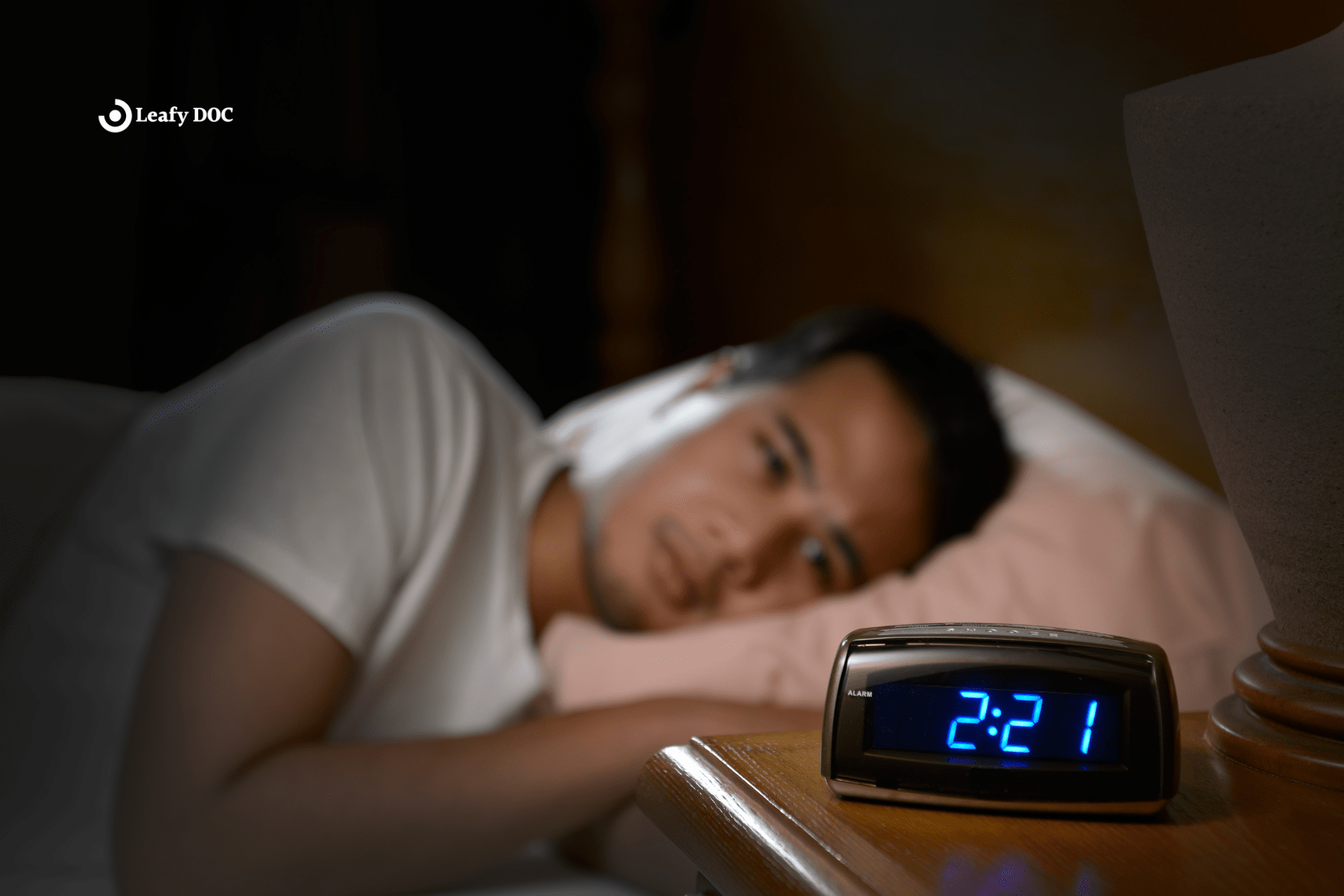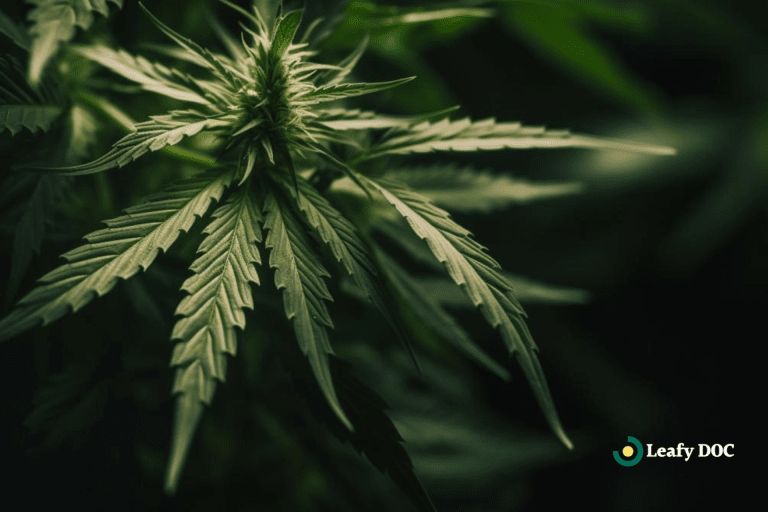Using Medical Marijuana for Insomnia and Sleep Disorders: Benefits and Risks
by Haley Mills · June 29, 2023
Discover the benefits of using medical marijuana for insomnia and sleep disorders. Learn about the potential benefits and risks of using cannabis for sleep.

Sleep is essential to our well-being, yet many people struggle to get a good night’s rest. Insomnia and sleep disorders have become increasingly prevalent in today’s fast-paced, stress-filled world. As more and more individuals search for solutions, medical marijuana has emerged as a potential answer.
This article will explore the benefits and risks of using medical marijuana to treat insomnia and sleep disorders. We’ll dive into the science behind this plant-based remedy while addressing common misconceptions and discussing the concerns that may come to mind. So grab your favorite cozy blanket, get comfortable, and let’s uncover the world of cannabis as a sleep medicine.
The Science of Sleep: Understanding Insomnia and Sleep Disorders
Sleep is a complex, yet essential, process that allows our bodies to rejuvenate and our minds to process information from the day. It consists of several stages, including non-rapid eye movement (NREM) and rapid eye movement (REM) sleep. Ideally, we cycle through these stages multiple times each night, with REM sleep being the most restorative.
Insomnia is a sleep disorder characterized by difficulty falling asleep, staying asleep, or waking up too early, resulting in inadequate or poor-quality sleep. It can be acute (short-term) or chronic (long-lasting) and may result from stress, anxiety, pain, medical conditions, or lifestyle factors. Sleep disorders, such as sleep apnea, restless legs syndrome, and narcolepsy, can also disrupt sleep patterns and negatively impact overall health and well-being.
Lack of quality sleep can lead to a range of issues, including daytime fatigue, impaired cognitive function, mood disturbances, and weakened immune systems. Therefore, finding effective treatments for insomnia and sleep disorders is crucial for maintaining good health and quality of life.
How Medical Marijuana Works: The Role of Cannabinoids
Medical marijuana refers to the use of the Cannabis sativa plant or its extracts to alleviate symptoms of various medical conditions, including insomnia and sleep disorders. The plant contains over 100 biologically active compounds known as cannabinoids, which interact with our body’s endocannabinoid system (ECS). The ECS is a complex cell-signaling system that plays a role in maintaining homeostasis, or balance, within the body. It regulates various functions such as pain, mood, appetite, and sleep.
The two most well-known cannabinoids are delta-9-tetrahydrocannabinol (THC) and cannabidiol (CBD). THC is primarily responsible for the psychoactive effects or “high” associated with marijuana use, while CBD is non-psychoactive and has been found to have numerous therapeutic properties.
Cannabinoids interact with the ECS by binding to specific receptors, mainly CB1 and CB2. These receptors are found throughout the body, including the central nervous system and the immune system. When cannabinoids bind to these receptors, they modulate various physiological processes, including sleep.
THC is known to have sedative effects and may help with sleep onset, while CBD has been found to have anxiolytic and analgesic properties, which can alleviate anxiety and pain, two common factors contributing to insomnia. Additionally, specific terpenes, aromatic compounds found in the cannabis plant, may also play a role in promoting relaxation and sleep.
Overall, medical marijuana’s interaction with the endocannabinoid system and its modulation of various physiological processes show promise as a treatment for insomnia and sleep disorders.
Cannabinoids: Key Components for Sleep Improvement
Cannabinoids are the biologically active compounds found in the cannabis plant that interact with the endocannabinoid system (ECS) and provide potential therapeutic benefits for various medical conditions, including insomnia and sleep disorders. The two most prominent cannabinoids are delta-9-tetrahydrocannabinol (THC) and cannabidiol (CBD), which have distinct properties that can contribute to sleep improvement.
THC: The primary psychoactive component in cannabis, THC, has been shown to have sedative effects, which can help individuals fall asleep faster. It may also help reduce the time spent in REM sleep, which could lead to fewer nightmares and better overall sleep quality for those with conditions like PTSD. However, high doses of THC can also lead to feelings of anxiety or paranoia, so finding the right balance is essential.
CBD: While CBD is not psychoactive like THC, it has a variety of therapeutic properties that can contribute to better sleep. CBD has been shown to have anxiolytic and analgesic effects, which can help alleviate anxiety and pain that often interfere with sleep. Additionally, CBD may help regulate sleep patterns by increasing overall sleep duration and reducing the time it takes to fall asleep.
Cannabis also contains other lesser-known cannabinoids, such as cannabinol (CBN) and cannabigerol (CBG), which have been found to have potential sedative and muscle-relaxing properties, respectively. The combination of these cannabinoids, along with the plant’s terpenes, creates an entourage effect that may enhance the overall sleep-promoting benefits of medical marijuana.
Indica, Sativa, and Hybrid Strains: Choosing the Right Variety
Cannabis plants are typically classified into three main categories: indica, sativa, and hybrid strains. Each category is associated with specific characteristics that may influence their effects on sleep.
Indica: Indica strains are generally believed to be more relaxing and sedative, making them a popular choice for individuals looking to improve their sleep. They tend to have higher levels of CBD and a higher CBD-to-THC ratio, which can help alleviate anxiety and pain without causing the intense psychoactive effects associated with higher THC levels. Common indica strains for sleep include Granddaddy Purple, Northern Lights, and Blueberry.
Sativa: Sativa strains are known for their uplifting and energizing effects, making them less suitable for those seeking help with sleep. They typically have higher THC levels and lower CBD-to-THC ratios, which can lead to feelings of euphoria and increased focus. However, some people may find that certain sativa strains help with sleep, depending on their unique body chemistry and the specific strain’s cannabinoid and terpene profile.
Hybrid: Hybrid strains are a combination of indica and sativa plants, providing a mix of effects that can be tailored to an individual’s specific needs. These strains can be indica- or sativa-dominant or balanced, offering a range of options for those seeking sleep improvement. Some popular hybrid strains for sleep include OG Kush, White Widow, and Girl Scout Cookies.
When choosing the right cannabis strain for sleep, it is essential to consider the specific cannabinoid profile, terpene content, and the individual’s unique body chemistry. It may take some experimentation to find the most effective strain for one’s sleep needs, and it is always best to consult with a healthcare professional or a knowledgeable dispensary staff member for guidance.
Medical Marijuana and Insomnia: The Calming Connection
Medical marijuana’s potential to help those suffering from insomnia is rooted in its calming and sedative properties. The interaction of cannabinoids like THC and CBD with the endocannabinoid system helps regulate the body’s sleep-wake cycle, promoting relaxation and sleepiness.
THC is known for its sedative effects. By reducing sleep latency, or the time it takes to fall asleep, THC may help people with insomnia fall asleep faster. Furthermore, CBD, the non-psychoactive component, has anxiolytic and analgesic properties, which can ease anxiety and pain, common factors that contribute to insomnia.
Medical marijuana’s ability to induce relaxation and reduce sleep latency can be particularly helpful for those with insomnia caused by stress, anxiety, or chronic pain. However, it is crucial to find the right balance of THC and CBD, as well as the appropriate strain and dosage, to achieve the desired effects on sleep without causing unwanted side effects.
Addressing Pain and Discomfort: Marijuana’s Impact on Sleep Quality
Chronic pain is a common issue that affects many people and can significantly disrupt sleep quality. Medical marijuana has been found to have analgesic properties, making it a potential treatment option for those experiencing pain-related sleep disturbances.
Cannabinoids interact with the endocannabinoid system’s receptors to modulate pain perception and inflammation. This interaction can provide relief from various types of pain, including neuropathic, inflammatory, and nociceptive pain.
By reducing pain and discomfort, medical cannabis products may help users fall asleep more easily and stay asleep throughout the night. This can lead to improved sleep quality and more restorative rest, which can positively impact overall health and well-being. It is essential to consult with a healthcare professional to determine the appropriate strain, method of consumption, and dosage for effective pain management and sleep improvement.
Reducing Anxiety and Stress: A Pathway to Restful Nights
Anxiety and stress can significantly interfere with sleep, making it difficult for people to fall asleep, stay asleep, or achieve restorative sleep. Medical marijuana’s potential to alleviate anxiety and stress may provide a pathway to restful nights for those who struggle with these issues.
CBD, one of the primary cannabinoids found in cannabis, has been shown to have anxiolytic properties. It helps reduce anxiety by interacting with serotonin receptors in the brain, which play a vital role in mood regulation. Additionally, some terpenes found in cannabis, such as linalool and myrcene, have been shown to have calming and relaxing effects that can contribute to reducing stress.
By addressing anxiety and stress, medical marijuana may help create a more conducive environment for sleep, allowing users to fall asleep more easily and achieve a more restful night’s sleep. As with any treatment, it is essential to consult with a healthcare professional to determine the appropriate strain, method of consumption, and dosage for effective anxiety and stress management to improve sleep.
The Role of Terpenes in Sleep Enhancement
Terpenes are aromatic compounds found in the cannabis plant that contribute to its distinct smell and taste. They also play a significant role in the plant’s therapeutic effects, including sleep enhancement. Terpenes work synergistically with cannabinoids, like THC and CBD, to create the entourage effect, which enhances the overall benefits of medical marijuana.
Some terpenes have been found to have sleep-promoting properties, including:
- Myrcene: This terpene has sedative and muscle-relaxing effects, which can help users unwind and fall asleep more easily. It is commonly found in indica strains and is associated with the “couch-lock” sensation that promotes relaxation and sleep.
- Linalool: Known for its floral scent, linalool has calming and anxiety-reducing effects that can help users relax and prepare for sleep. It is often found in lavender, which has been used traditionally to promote relaxation and sleep.
- Terpineol: This terpene has sedative properties and may help users fall asleep faster and achieve more restorative sleep. It is commonly found in strains known for their sleep-promoting effects.
When choosing medical marijuana for sleep, it is essential to consider the terpene profile in addition to the cannabinoid content. Terpenes can enhance the overall sleep-promoting properties of cannabis, making them an important factor in selecting the most effective strain for sleep improvement.
Methods of Consumption: Inhaling, Ingesting, and Topicals
There are various methods for consuming medical marijuana, each with its unique benefits and considerations. The most common methods include inhaling, ingesting, and applying topicals.
- Inhaling: Smoking or vaporizing inhaled cannabis affects sleep in the the most rapid way, as the cannabinoids are quickly absorbed into the bloodstream through the lungs. This method allows for precise dosage control and faster relief from symptoms. However, smoking can be harsh on the respiratory system, and vaporizing may be a healthier alternative.
- Ingesting: Edibles, tinctures, and capsules are popular methods for ingesting medical marijuana. This method provides long-lasting effects, but the onset can take anywhere from 30 minutes to 2 hours. Dosage control can be more challenging with edibles, and it is important to start with a low dose and wait for the effects to manifest before consuming more.
- Topicals: Cannabis-infused creams, lotions, and balms can be applied directly to the skin for localized pain relief and inflammation. While topicals may not provide the systemic effects needed for sleep improvement, they can be helpful for those experiencing pain-related sleep disturbances.
Finding the Right Dosage for Your Sleep Needs
Determining the right dosage of medical marijuana for sleep can be a trial-and-error process, as individual responses to cannabis can vary. Factors such as body weight, metabolism, tolerance, and the specific strain and method of consumption can all influence the optimal dosage.
When starting medical marijuana for sleep, it is best, to begin with a low dose and gradually increase it until the desired effects are achieved. It may be helpful to keep a sleep journal to track your progress and monitor your response to different dosages and strains.
Consulting with a healthcare professional or a knowledgeable dispensary staff member can provide guidance on finding the appropriate dosage for your specific sleep needs. Remember that patience and consistency are key when determining the right dosage for optimal sleep improvement.
Potential Side Effects and Precautions: What to Watch For
While medical marijuana can provide relief for insomnia and sleep disorders, it is essential to be aware of potential side effects and take necessary precautions. Some common side effects associated with medical marijuana use include:
- Dizziness or lightheadedness
- Dry mouth
- Bloodshot or red eyes
- Increased heart rate
- Short-term memory impairment
- Fatigue or drowsiness
In some cases, higher doses of THC can cause feelings of anxiety, paranoia, or even hallucinations. To minimize these side effects, start with a low dose and gradually increase it, paying close attention to your body’s response. If side effects persist or worsen, consult with a healthcare professional.
It is crucial to avoid operating heavy machinery, driving, or engaging in activities that require mental alertness while under the influence of medical marijuana. Additionally, combining medical marijuana with other sedative medications or alcohol may result in increased drowsiness or impaired coordination, so it is essential to exercise caution.
Pregnant or breastfeeding women should avoid using medical marijuana, as the potential risks to the baby are not well understood. Those with a history of heart disease, respiratory issues, or other serious medical conditions should consult with a healthcare professional before using medical marijuana.
Legal Considerations and Prescription Process
The legal status and prescription process for medical marijuana varies depending on the country or state in which you reside. In some regions, medical marijuana is legal for individuals with qualifying medical conditions, while recreational use may also be allowed in other areas. It is important to familiarize yourself with the specific laws and regulations in your region before pursuing medical marijuana as a treatment option.
Generally, to obtain medical marijuana, you will need to follow these steps:
- Consult with a healthcare professional: Speak with a doctor or healthcare provider who is knowledgeable about medical marijuana and its potential benefits and risks. They can determine whether you have a qualifying medical condition and discuss the potential benefits and drawbacks of using medical marijuana for your sleep issues.
- Obtain a recommendation or prescription: If your healthcare provider determines that medical marijuana is an appropriate treatment option, they will provide a recommendation or prescription, depending on the requirements in your region.
- Register with a medical marijuana program: In some areas, patients need to register with a state or national medical marijuana program to access cannabis legally. This process may involve providing personal information, your healthcare provider’s recommendation or prescription, and paying a registration fee.
- Visit a licensed dispensary: Once registered, you can visit a licensed dispensary to obtain medical marijuana. Dispensary staff members can help you choose the appropriate strain, method of consumption, and dosage for your specific sleep needs.
- Follow local laws and regulations: Be sure to familiarize yourself with local laws and regulations regarding the possession, consumption, and transportation of medical marijuana. Compliance with these laws is essential to avoid legal complications.
Remember, the legal status and prescription process for medical marijuana can vary significantly between regions. Cannabis is still categorized under illicit recreational drugs on a federal level. Always consult with a healthcare professional and follow local laws and regulations to ensure that you are using medical marijuana safely and legally.
A Look at the Research: Studies on Marijuana and Sleep
Research on the effects of medical marijuana on sleep is still in its early stages, but several studies have provided promising insights into its potential benefits for those suffering from insomnia and sleep disorders.
- A 2008 study published in the journal Sleep conducted clinical trials that found THC reduced the amount of time it took participants to fall asleep and increased slow-wave sleep, the deepest stage of non-REM sleep. However, the study also noted that THC could cause sleep disturbances in higher doses.
- A 2013 study published in the Journal of Psychoactive Drugs found that medical marijuana users reported significant improvements in insomnia symptoms and overall sleep quality. Participants also reported reductions in pain and anxiety, two common factors that contribute to disturbances to a person’s natural sleep cycle and can lead to obstructive sleep apnea.
- A 2019 study published in the journal Medicines conducted a critical review and found that CBD could help improve sleep and reduce anxiety in participants with anxiety and sleep disorders. The study suggested that CBD’s anxiolytic properties played a significant role in improving sleep quality.
While these studies show promising results, more extensive and long-term research is needed to fully understand the effects of medical marijuana on sleep and its potential benefits and risks. As research advances, it will provide a better understanding of the most effective strains, dosages, and methods of consumption for treating sleep disorders.
Alternative Sleep Aids: Comparing Medical Marijuana to Other Options
There are various sleep aids available to those struggling with insomnia and sleep disorders. Comparing medical marijuana to other options can help individuals make informed decisions about the best treatment for their specific needs.
- Over-the-counter (OTC) sleep aids: These medications, such as antihistamines and melatonin supplements, are widely available and can provide temporary relief from sleep disturbances. However, a sleep aid may not be effective for chronic insomnia, and long-term use can result in dependence or decreased effectiveness.
- Prescription sleep medications: Doctors may prescribe medications like benzodiazepines, non-benzodiazepine hypnotics, or antidepressants to treat sleep disorders. While these medications can be effective, they may also cause side effects such as daytime drowsiness, memory impairment, and potential dependence.
- Cognitive-behavioral therapy for insomnia (CBT-I): This non-pharmacological approach focuses on identifying and addressing the underlying thoughts and behaviors that contribute to sleep disturbances. CBT-I has been shown to be effective in improving sleep quality and reducing insomnia symptoms for those with posttraumatic stress disorder without the side effects associated with medications.
- Natural remedies and lifestyle changes: Incorporating relaxation techniques, such as meditation, deep breathing exercises, and progressive muscle relaxation, can help improve deep sleep quality. Additionally, maintaining a consistent sleep schedule, creating a sleep-conducive environment, and avoiding stimulants close to bedtime can help promote better sleep.
Medical marijuana may be a suitable alternative for some individuals, particularly those who have not found relief with other sleep aids or prefer a more natural approach. It is important to consider the potential benefits and risks of each option and consult with a healthcare professional to determine the most appropriate treatment for your sleep needs.
In Conclusion: Weighing the Benefits and Risks of Medical Marijuana for Sleep Disorders
Medical cannabis holds promise for many individuals struggling with insomnia and sleep disorders. Its ability to help users relax, reduce anxiety, and alleviate pain may lead to a better night’s sleep. However, it’s important to remember that every person’s experience with cannabis use can vary, and some may experience side effects or find it unsuitable for their needs.
As with any treatment for sleep problems, it’s crucial to consult with a healthcare professional before incorporating medical marijuana into your sleep routine. By staying informed about the benefits and risks, you can make the best decision for your health and well-being. Sweet dreams!
Last Updated: August 8, 2024
Get Approved for Your Medical Marijuana Card in Minutes!

Get Your Medical Card
Connect with a licensed physician online in minutes

Like This Article?
Share with your friends
Table of Contents
Keep Reading
-
4 Steps to Find Medical Marijuanas Doctors in Alabama
Find qualified medical marijuanas doctors in Alabama with our comprehensive 4-step guide.
-
How Long Does THC Remain In Hair Follicles?
Curious about THC and hair follicle testing? Find out how long THC stays in hair follicles and get the truth about drug testing. Click now for all the answers you need!
-
Navigating Challenges In The Cannabis Industry: Trends And Strategies
Stay ahead of the curve in the cannabis industry with our insights on navigating challenges, trends, and strategies for success. Learn how to overcome obstacles and thrive in this competitive market. Click now to master the art of conquering cannabis industry challenges!



